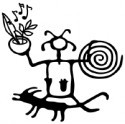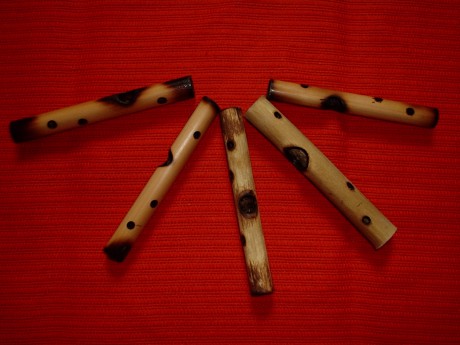Mijwiz
Mijwiz , Arabic for "dual", is a double-pipe, single-reed instrument (sometimes referred to as a "double-clarinet") popular in Syria, Lebanon, and Palestine. Mijwiz, arabský výraz pro "dvojí", je double-pipe, jeden-rákos nástroj (někdy označovaná jako "double-klarinet"), populární v Sýrii, Libanonu a Palestině. It is predominantely used to accompany the dabkah , or line dance, at weddings and other festive celebrations. The mijwiz is one of the oldest wind instruments, with counterparts in antiquity. Je predominantely používá doprovázet dabkah, nebo line dance, na svatby a jiné slavnostní oslavy. Mijwiz je jedním z nejstarších dechových nástrojů, s kolegy ve starověku. Comparable instruments in Egypt are the zummârah and the arghûl , which uses one of the two pipes as a drone. Obdobných nástrojů v Egyptě jsou zummârah a arghûl, který používá jeden ze dvou trubek jako trubec.
The mijwiz consists of two identical cylindrical cane pipes bound together with a tar or beeswax coated string. Mijwiz se skládá ze dvou identických válcových trubek třtiny svázány s dehtu nebo včelím voskem potažené řetězec. Each pipe is fitted with a single idioglot vibrating reed. Každá trubka je opatřena jedním idioglot vibrační rákosu. The instrument is played continuously (without stopping) through a technique known as "circular breathing", with the entire mouthpiece inside the mouth. Nástroj se hraje nepřetržitě (bez zastavení), přes techniku známou jako "cirkulační dýchání", s celým náustek uvnitř úst. It has five to six holes, a range just under an octave and considerable radiating power. To má pět až šest jamek, pohybovat pod oktávu a značnému vyzařování energie. The pipes are traditionally played in unison. Trubky jsou tradičně hrají v souzvuku.
In folk communities of the Near East, the nasal sound of the mijwiz has distinct rustic connotations and an almost magical effect upon the listeners. V lidové komunit Blízkého východu, nosní zvuk mijwiz má výrazné rustikální konotace a téměř kouzelný účinek na posluchače.

Mijwiz
From Wikipedia, the free encyclopedia Z Wikipedie, otevřená encyklopedie
The mijwiz ( Arabic : مجوز ) is a traditional musical instrument of Syria and the Druze . Mijwiz (arabsky: مجوز) je tradiční hudební nástroj ze Sýrie a drúzské. Its name in Arabic means "dual," or "married" because of its consisting of two, short, bamboo reed pipes put together, making the mijwiz a double-pipe, single-reed woodwind instrument . Její jméno v arabštině znamená "dvojí" nebo "manželství", protože jeho skládající se ze dvou, krátké, bambusové rákosí potrubí dát dohromady, což mijwiz double-pipe, jeden-rákos dechové nástroje. The mijwiz consists of two pipes of equal length, between 6 and 8 centimeters; each pipe has around five or six small holes for fingering. Mijwiz se skládá ze dvou potrubí stejné délky, mezi 6 a 8 cm, každá trubka má asi pět nebo šest malých otvorů pro prstoklad. It requires a special playing technique known as " circular breathing ," which is tricky but produces a continuous tone, without pausing to take a breath. To vyžaduje speciální techniku hry známé jako "cirkulační dýchání", což je náročné, ale vytváří trvalý tón, aniž by se zastavil, aby se nadechla. The mijwiz is played in Egypt and the Levant as an accompaniment to either belly dancing or dabke , the folkloric line dance of the Levant. Mijwiz se hraje v Egyptě, a Levant jako doprovod buď břišní tanec, nebo dabke, folklórní tanec linie z Levant. The mijwiz is most popular today in the Levant (Lebanon, Palestine, and Syria). Mijwiz je nejpopulárnější dnes v Levant (Libanon, Palestina a Sýrie). Many popular folk songs either include the mijwiz on recordings, or include the instrument's name in the song's lyrics. Mnoho populárních lidových písní buď obsahovat mijwiz na nahrávkách nebo obsahují nástroje jméno ve slovech písně. One example is the famous Lebanese dabke song "Jeeb el Mijwiz ya Abboud" (Arabic: جيب المجوز يا عبّود ) by the singer Sabah. Jedním z příkladů je slavný libanonský dabke píseň "Jeeb el Mijwiz ya Abboud" (arabsky: جيب المجوز يا عبود), kterou zpěvák Sabah.

